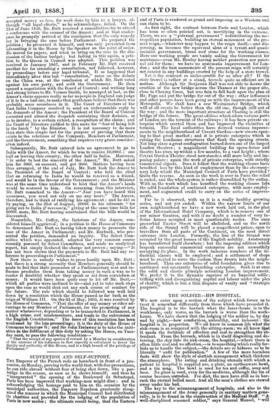SUBVENTION AND SELF-SUPPORT.
THE Emperor of the French rode on horseback in front of a pro- cession, on Monday, proving to the world that, with due precautions, he can ride abroad without fear of being shot down, like a par- tridge in the season, as soon as he shows himself; and thus he "inaugurated" the opening of the Boulevard de Sebastopol. Paris has been improved that working-men might dine ; and in acknowledging the homage paid. to him on the occasion by the municipal authorities' the Emperor Napoleon graciously recog- nized the manner in which the Municipal Council had distributed its charities and provided for the lodging of the population of Paris in near modes; the ultimate result being, that the Eastern
end of Paris is rendered as grand and imposing as a Western end can claim to be.
As first sight, the contrast between Paris and London, which has been so often pointed out, is mortifying in the extreme. There, we see a "paternal government" redistributing the me- tropolitan population, building an eternal monument of the pre- sent 'reign,—whatever may happen to the reign itself,—and dis- pensing, as becomes the equivocal alms of a tyrant and quasi- socialist government, bread and stone for the working classes. Here our working people are vainly asking the Government for assistance—even Mr. Henley having neither protection nor pater- nal aid for them ; we have no systematic improvement for Lon- don; and the best monuments of the present reign will certainly not consist in any buildings erected by the help of a state trowel.
Yet is the contrast so unfavourable for us after all ? If the state trowel is rather at a stand, trowels quite as efficient are in motion. Although Sir Benjamin Hall was not able to decree the erection of the new bridge across the Thames at the proper site, close to Charing Cross' but was fain to fall back upon the plan of Mr. Page and put the bridge far cut of the way ; other influences and other powers have been going on with the improvement of the Metropolis. We shall have a new Westminster Bridge which will at all events be better than the old one, though still out of the way ; and the more important structure at Charing is still the bridge of the future. The great edifices which adorn various parts of London are the termini of the railways ; it has been private en- terprise which erected them and has improved the vicinities of termini. The local authorities have decreed various improve- ments in the neighbourhood of Covent Garden—new streets open- ing to that great market ; and it is private enterprise which is raising the handsome structures that flank the opening streets. Not long since a great conflagration burned down one of the largest London theatres ; a magnificent building for opera-house and theatre has risen up within a few months, to a vast height ; where Covent Garden Theatre stood now stands a still more lofty and im- posing palace ; again the work of private enterprise, with strictly commercial objects. Does it follow that the working classes have benefited less by this kind of employment than by the eleemosy- nary help which the Municipal Council of Paris have provided ? Quite the reverse. As soon as the work is over in Paris the relief is ended, and the whole system is rather discredited by the outlay. With us the work which has benefited the working classes lays the solid foundation of continued enterprise, with more employ- ment, and augmented credit to carry on the series of improve- ments.
For be it observed, with us it is a really healthy growing series, and not yet ended. Within the narrow limits of our own neighbourhood we have a new work laid out, in the plan of the International Hotel Company., which is to remove one of our minor theatres, and with it no doubt a number of very in- ferior houses occupied in most questionable modes. The once proverbial Exeter Street will be abolished, and on the north side of the Strand will be placed a magnificent palace, open to travellers from all parts of the Continent, on the most direct entrance into London. Formerly, the line of the Strand was occupied by the great houses of the English nobility. Aristocracy has transferred itself elsewhere ; but the imposing edifices which bespeak successful commercial enterprise are not unworthily occupying its place. In the work immense numbers of the in- dustrial classes will be employed ; and a settlement of shops must be created to serve the custom thus drawn into the neigh- bourhood. Thus one enterprise of solid foundation gives rise to continued and constantly. branching enterprise. Such is at once the solid and elastic principle actuating London improvement. We prefer it to the dynastic caprices of an Imperial cedile ; trifling with and disorganizing capital and labour under the plea of charity, which is but a thin disguise of vanity and "strategic purposes.


























 Previous page
Previous page